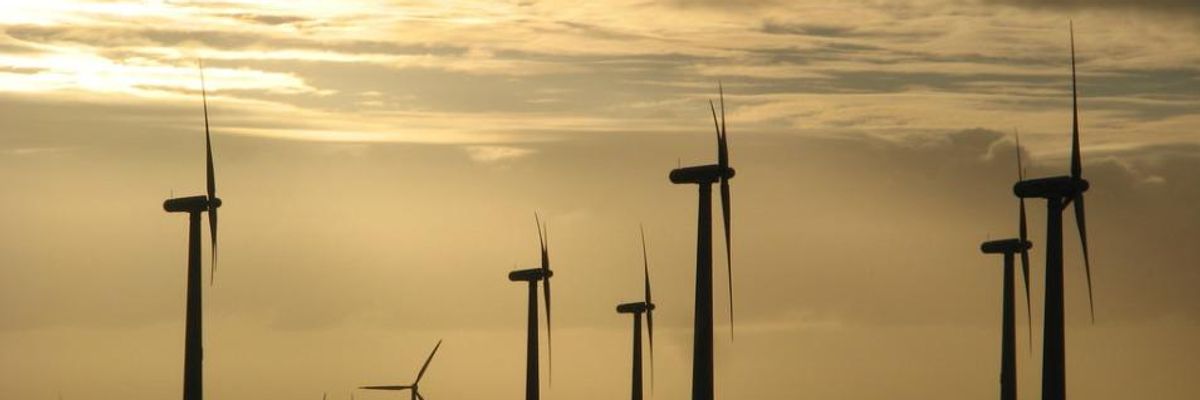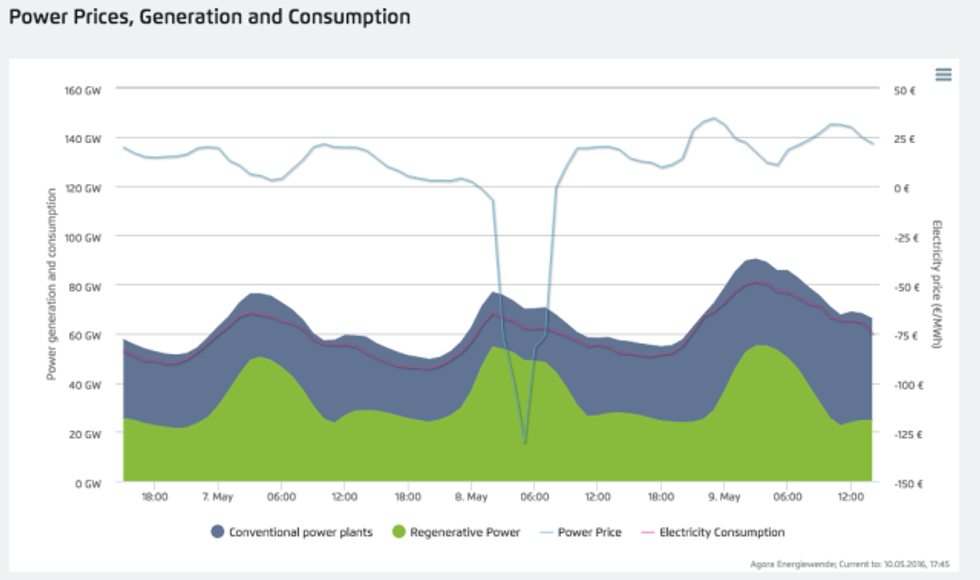
A German wind farm. (Photo: Dirk Ingo Franke/cc/flickr)
To donate by check, phone, or other method, see our More Ways to Give page.

A German wind farm. (Photo: Dirk Ingo Franke/cc/flickr)
Germany, the fourth-largest economy in the world and a leader in renewable energy, produced so much energy this weekend from its solar, wind, hydro, and biomass plants that power prices went into negative territory for several hours. Consumers were being paid to use energy.
According to Quartz, around 1 pm on Sunday, May 8--a particularly "sunny and windy day"--the plants supplied a combined 55 gigawatts, or 87 percent, of the 63 gigawatts being consumed.
"The power system adapted to this quite nicely," Christoph Podewil, of the German clean energy think tank Agora Energiewende, told the publication. "This day shows again that a system with large amounts of renewable energy works fine."
According to Agora, the average renewable mix in 2015 was 33 percent.

"This is big," wrote Jeremy Deaton, a journalist with Climate Nexus. "Sunday's spike in renewable output shows that wind and solar can keep pace with the demands of an economic powerhouse. What's more, the growth of clean energy has tracked the growth of Germany's economy."
Another key takeaway, according to Deaton, is that the milestone was made possible because of a people-powered "energy revolution."
"Sunday's performance highlights the success of the Energiewende, or 'energy transition,' Germany's push to expand clean energy, increase energy efficiency, and democratize power generation," he wrote. "Smart policies have opened the renewable energy market to utilities, businesses and homeowners. As of 2012, individuals owned more than a third of Germany's renewable energy capacity."
However, according to the reporting, the green power haul was slightly complicated by the inability of nuclear and coal plants to be taken offline "so they went on running and had to pay to sell power into the grid for several hours, while industrial consumers...earned money by consuming electricity."
Which, campaigners note, is all the more reason for Germany to expedite its sustainable development goal of reaching 100 percent renewable energy by 2050.
Leaders in Germany are currently debating reforms to the country's clean energy policies, which the renewable energy industry has expressed concern over. Among other policy items, the government has proposed slashing support for onshore wind energy by 7.5 percent starting January 2017, according to a draft document reported on by Reuters Wednesday.
Common Dreams is powered by optimists who believe in the power of informed and engaged citizens to ignite and enact change to make the world a better place. We're hundreds of thousands strong, but every single supporter makes the difference. Your contribution supports this bold media model—free, independent, and dedicated to reporting the facts every day. Stand with us in the fight for economic equality, social justice, human rights, and a more sustainable future. As a people-powered nonprofit news outlet, we cover the issues the corporate media never will. |
Germany, the fourth-largest economy in the world and a leader in renewable energy, produced so much energy this weekend from its solar, wind, hydro, and biomass plants that power prices went into negative territory for several hours. Consumers were being paid to use energy.
According to Quartz, around 1 pm on Sunday, May 8--a particularly "sunny and windy day"--the plants supplied a combined 55 gigawatts, or 87 percent, of the 63 gigawatts being consumed.
"The power system adapted to this quite nicely," Christoph Podewil, of the German clean energy think tank Agora Energiewende, told the publication. "This day shows again that a system with large amounts of renewable energy works fine."
According to Agora, the average renewable mix in 2015 was 33 percent.

"This is big," wrote Jeremy Deaton, a journalist with Climate Nexus. "Sunday's spike in renewable output shows that wind and solar can keep pace with the demands of an economic powerhouse. What's more, the growth of clean energy has tracked the growth of Germany's economy."
Another key takeaway, according to Deaton, is that the milestone was made possible because of a people-powered "energy revolution."
"Sunday's performance highlights the success of the Energiewende, or 'energy transition,' Germany's push to expand clean energy, increase energy efficiency, and democratize power generation," he wrote. "Smart policies have opened the renewable energy market to utilities, businesses and homeowners. As of 2012, individuals owned more than a third of Germany's renewable energy capacity."
However, according to the reporting, the green power haul was slightly complicated by the inability of nuclear and coal plants to be taken offline "so they went on running and had to pay to sell power into the grid for several hours, while industrial consumers...earned money by consuming electricity."
Which, campaigners note, is all the more reason for Germany to expedite its sustainable development goal of reaching 100 percent renewable energy by 2050.
Leaders in Germany are currently debating reforms to the country's clean energy policies, which the renewable energy industry has expressed concern over. Among other policy items, the government has proposed slashing support for onshore wind energy by 7.5 percent starting January 2017, according to a draft document reported on by Reuters Wednesday.
Germany, the fourth-largest economy in the world and a leader in renewable energy, produced so much energy this weekend from its solar, wind, hydro, and biomass plants that power prices went into negative territory for several hours. Consumers were being paid to use energy.
According to Quartz, around 1 pm on Sunday, May 8--a particularly "sunny and windy day"--the plants supplied a combined 55 gigawatts, or 87 percent, of the 63 gigawatts being consumed.
"The power system adapted to this quite nicely," Christoph Podewil, of the German clean energy think tank Agora Energiewende, told the publication. "This day shows again that a system with large amounts of renewable energy works fine."
According to Agora, the average renewable mix in 2015 was 33 percent.

"This is big," wrote Jeremy Deaton, a journalist with Climate Nexus. "Sunday's spike in renewable output shows that wind and solar can keep pace with the demands of an economic powerhouse. What's more, the growth of clean energy has tracked the growth of Germany's economy."
Another key takeaway, according to Deaton, is that the milestone was made possible because of a people-powered "energy revolution."
"Sunday's performance highlights the success of the Energiewende, or 'energy transition,' Germany's push to expand clean energy, increase energy efficiency, and democratize power generation," he wrote. "Smart policies have opened the renewable energy market to utilities, businesses and homeowners. As of 2012, individuals owned more than a third of Germany's renewable energy capacity."
However, according to the reporting, the green power haul was slightly complicated by the inability of nuclear and coal plants to be taken offline "so they went on running and had to pay to sell power into the grid for several hours, while industrial consumers...earned money by consuming electricity."
Which, campaigners note, is all the more reason for Germany to expedite its sustainable development goal of reaching 100 percent renewable energy by 2050.
Leaders in Germany are currently debating reforms to the country's clean energy policies, which the renewable energy industry has expressed concern over. Among other policy items, the government has proposed slashing support for onshore wind energy by 7.5 percent starting January 2017, according to a draft document reported on by Reuters Wednesday.